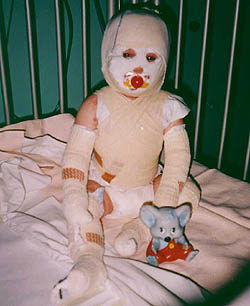How to Manage your Child's Eczema

Up to 10 per cent of children under the age of five develop eczema. The disease in a child calls for special attention. Below are some tips for helping your child to manage their eczema:
Easing your child's emotional stress associated with eczema
Children, like adults, experience emotional stress which can exacerbate their eczema. To help your child cope with their illness, it's important to develop and maintain a routine. Anyone who cares for your child should also keep to this routine. Talk to your child about eczema and inform him/her about what triggers the disease and how to avoid them.
Explain the importance of treatment and how necessary it is to use moisturiser and medicine. Also teach your child to field comments about their eczema from other children and even adults. If your child is old enough, help him/her find ways to explain that the disease is not contagious and how to discuss it with their friends at school. Most importantly, inform your child that in all likelihood, their eczema will get easier to live with as they grow older and they may even outgrow it.
- Moisturise - bathe your child in lukewarm water for up to five minutes using mild soap or non-soap cleansers recommended by a doctor.
- After bathing your child, pat the skin dry and apply a moisturising cream or ointment within three minutes.
- Only use soaps, laundry detergents and moisturisers as recommended by your doctor and avoid anything perfumed.
- Keep your child's fingernails short to prevent their scratching from breaking the skin.
- Dress them in 100 per cent cotton clothing to reduce sweating, which can be an irritant. After purchasing new clothing, wash them before dressing your child to make them softer and remove any tags to avoid irritating the skin.
- Avoid wool and other coarse or rough-textured clothing or blankets and if possible, remove wool carpets. If you are wearing woollen clothing, put a cotton diaper over your shoulder when holding your child.
- Keep your child's room at an even temperature.
- Use a humidifier in dry or heated rooms to keep the air moist.
- If your child is allergic to dust or dust mites, use protective coverings for pillows and mattresses and wash bedclothes frequently in hot water.
- Keep pets off beds and other furniture, or outside.
- If night-time itching is a problem, use a cold, damp washcloth to soothe your child's skin, followed by a moisturiser and a sedating antihistamine, under the guidance of your doctor.
Easing your child's emotional stress associated with eczema
Children, like adults, experience emotional stress which can exacerbate their eczema. To help your child cope with their illness, it's important to develop and maintain a routine. Anyone who cares for your child should also keep to this routine. Talk to your child about eczema and inform him/her about what triggers the disease and how to avoid them.
Explain the importance of treatment and how necessary it is to use moisturiser and medicine. Also teach your child to field comments about their eczema from other children and even adults. If your child is old enough, help him/her find ways to explain that the disease is not contagious and how to discuss it with their friends at school. Most importantly, inform your child that in all likelihood, their eczema will get easier to live with as they grow older and they may even outgrow it.
MORE



